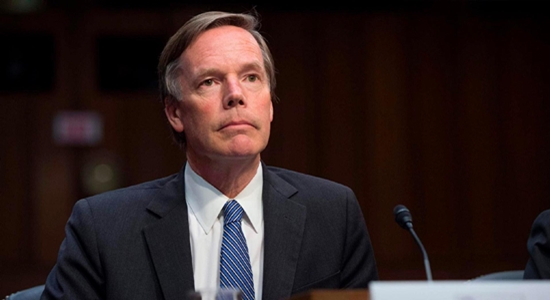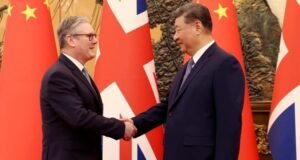
Among the revelations of The Wall Street Journal’s interview with U.S. Ambassador to China Nicholas Burns (shown above) is his view that “President-elect Donald Trump’s designs on Canada and Greenland will weaken Washington’s ability to confront adversaries such as China” (“Trump’s Canada and Greenland Threats Imperil China Fight, Says Departing Envoy,” January 15, 2025).
We can take as a given that in some geostrategic minds, any resistance to or preparation for resistance to China, Russia, or other established adversary states “will weaken Washington’s ability to confront” such adversaries.
Non sequiturs
Let’s deal with Canada another day. How specifically would either adding Greenland to U.S. territory or expanding U.S. military presence in Greenland “weaken Washington’s ability to confront adversaries such as China” even as China continuously strives in every possible way to ramp up its ability to threaten the non-totalitarian-bloc world?
“We’re facing, in Putin, in the Chinese Communist leadership, in Iran, in Venezuela, countries that want to unravel that international order that we have supported,” [Ambassador Burns] said. “The last thing we should do is insult and be disrespectful to the people of Canada or the people of Denmark….
“One of the greatest achievements in the history of the United States was the order that we helped to put into place following the Second World War…that the borders of the countries are sacrosanct, that the United States recognizes the inviolability of borders of other countries,” Burns said. “Our message to Putin and to the Chinese will be very strong and credible, when we practice that respect for the sovereignty, especially of our allies.”
If the U.S. “respects sovereignty” by making no demands on Denmark, then China and Russia will…respect sovereignty?
Burns also says that Biden stabilized ties with China…. Because Xi met with Biden a few times? As China continued and intensified its belligerence in the Taiwan Strait, South China Sea, and elsewhere?
Still, Burns said few moments were more perilous than in early 2023, when the U.S. shot down a suspected Chinese spy balloon that had drifted over the continental U.S., prompting mutual recriminations and a further breakdown in communication between the two countries.
Burns called it “the most tense moment” during his tenure. It took months of delicate diplomacy before the two countries were talking again at a high level.
The one thing the U.S. does not want to do is respond to Chinese provocations, Burns stresses. Because then things will get tense and communication (or pseudo-communication; see the Biden talks) will break down.
Burns can observe conduct that does not support his case.
The departing ambassador said that China hadn’t stopped impeding U.S. diplomatic activities in the country. He complained in an interview with the Journal last year about Chinese authorities disrupting or blocking Chinese citizens from attending embassy events, including cultural exhibits and round table discussions.
If anything, he said, the interference has gotten worse.
Burns said that since the June interview, authorities had broken up or otherwise disrupted a further 37 diplomatic events, bringing the total to 98 incidents since Biden and Chinese leader Xi Jinping met in late 2023 and agreed to step up engagement between ordinary citizens from the two sides.
So…Biden-normalization of relations with China means that China proceeds as usual or “worse.” Nevertheless, “Burns said that walking away and sanctioning China is the wrong approach. ‘If we do that, they’ll withdraw all their cooperation from us. They’ve made that very clear,’ he said. ‘My recommendation is continue to work with them because we’re getting something for it.’ ”
As evidence of our getting something, Burns mentions China’s release of a few China-detained Americans and letting an elderly Uyghur Muslim who had been prevented from leaving the country go join family in the United States. In return, China received “two imprisoned Chinese spies and at least one other Chinese citizen.”
The Chinese Communist Party seems to think that it’s a good idea to detain Americans who might then be used as bargaining chips. As for the Uyghurs, China imprisons, brainwashes, and tortures hundreds of thousands of them.
Burns also mentions China’s pretense of doing something to slow the export of fentanyl precursors. One must travel many column inches in the Journal’s report on U.S. and Chinese follow-up on the Biden-Xi “agreement” about fentanyl to learn why skepticism is warranted.
Reasons for U.S. concern
Meanwhile, Denmark has been offering to let the United States “increase US military presence in Greenland” (aa.com.tr, November 1, 2025, updated December 1, 2025).
Denmark proposed that US President-elect Donald Trump boost security in Greenland, including increasing the US military presence on the island, in its private messages to his team, American news website Axios reported on Saturday.
The Danish government wants to dissuade Trump from seizing the island by addressing his security concerns…
In his post on Truth Social in December, Trump, who will take office on Jan. 20, described the ownership and control of Greenland as an “absolute necessity” for the US, reiterating his desire to make the island part of the US.
Danish Prime Minister Mette Frederiksen said Friday she is seeking talks with Trump regarding his remarks about Greenland, adding that she does not believe the president-elect would attempt to seize the island by force.
The United States currently has one military base on the island.
Unsalutary neglect
A more recent story, from Reuters, quotes Defense Minister Troels Lund Poulsen: “We have neglected for many years to make the necessary investments in ships and in aircraft that will help monitor our kingdom, and that is what we are now trying to do something about.”
According to Jens Wenzel, with Nordic Defense Analysis, “the Americans are quite concerned that Russia could actually launch or initiate a major attack against the United States, and that could be done from the Russian side. There is no real monitoring of the airspace in Greenland, it is largely a free-for-all.”
In November 2024, Russia and China were conducting “joint Arctic operations for first time….”











